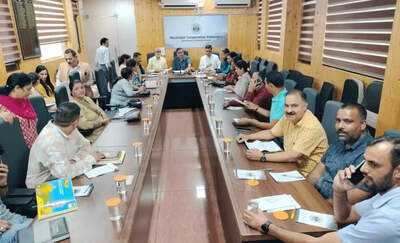
Kathmandu, Sep 12 (PTI): Former Chief Justice Sushila Karki on Friday night became Nepal's first woman prime minister to lead an interim government, ending days of political uncertainty after the K P Sharma Oli dispensation was forced to quit in the face of a nation-wide agitation triggered by a social media ban.
President Ramchandra Paudel administered the oath of office to Karki, 73, this evening three days after Oli resigned from the prime minister's post following the worst unrest that the Himalayan nation has witnessed in decades.
President Ramchandra Paudel said the new caretaker government led by interim Prime Minister Karki is mandated to hold fresh parliamentary elections within six months.
The swearing-in ceremony of the new prime minister was attended by Nepal's chief justice, senior government officials, security chiefs, and members of the diplomatic community.
In New Delhi, India welcomed the formation of the new Interim government in Nepal.
"We are hopeful that this would help in fostering peace and stability," the Ministry of External Affairs (MEA) said.
"As a close neighbour, a fellow democracy and a long term development partner, India will continue to work closely with Nepal for the well-being and prosperity of our two peoples and countries," it said.
Karki was chosen to lead the interim government after a meeting between President Paudel, Nepal's top military brass, and the youth protesters, who spearheaded the anti-government protests.
The former chief justice, known for her integrity and plain-speaking, studied in Banaras Hindu University.
A meeting held between President Paudel, the Nepal Army chief and representatives of the 'Gen Z' protesters agreed on Karki's name to head the interim government following a series of meetings.
In the first meeting of her cabinet, she is likely to recommend to the president the dissolution of the Parliament as per an understanding reached during the negotiations between the youth leaders and the president, top sources said.
President Paudel also consulted leaders of all major political parties, legal experts and civil society leaders separately before deciding to appoint Karki as the caretaker prime minister.
The major demands by the Gen Z protesters included checking corruption, ending political disorder, and nepotism.
The students-led "Gen Z" protests that began against a government ban on social media expanded into a larger campaign reflecting growing public criticism of the Oli dispensation and the country's political elite over alleged corruption and apathy towards the common people.
Though the ban on social media was lifted on Monday night, the intensity of protests grew on Tuesday with the focus of the agitation shifting to alleged corruption and luxury lifestyles of the political elite.
In his resignation letter to President Paudel, Oli had cited the "extraordinary circumstances" facing Nepal and said he is quitting to pave the way for a "constitutional and political" resolution of the current situation.
Earlier on Friday, Speaker of Nepal's House of Representatives Devaraj Ghimire and Chairman of the National Assembly Narayan Dahal called for resolving the ongoing political deadlock "within the framework of the Constitution." "The rule of law and constitutionalism must not be bypassed," said a joint statement, issued after a meeting between Ghimire and Dahal.
They also urged all parties to address the demands of protesters and commit to a stronger, more prosperous democracy.
"We are confident that we must not stray from the rule of law and constitutionalism," they said, stressing that the ongoing process to form a citizen-led government should address the protesters' demands while ensuring that democracy grows stronger and more resilient." Latest data from Nepal police said that at least 51 people, including an Indian national, died in the 'Gen Z'-led violent protests that began on Monday.
The Nepalese Army took control of the security situation after Oli resigned as the prime minister.
Senior Superintendent of Police Ramesh Thapa, who is co-spokesperson for Nepal police, said the casualties include one Indian national and three policemen, The Kathmandu Post newspaper reported.
Soon after taking control of the law and order situation after the collapse of the government, the Army had issued prohibitory orders.
The Army on Thursday extended prohibitory orders in three districts of Kathmandu Valley while allowing public movement during specific windows, as the Himalayan nation gradually returned to normalcy.
Meanwhile, the Hotel Association Nepal (HAN) on Friday said Nepal's hotel industry, a vital revenue earner of its tourism-driven economy, has suffered a loss of over 25 billion Nepalese rupees after nearly two dozen hotels across the country were vandalised, looted or torched during the student-led anti-government protests.
Among the worst hit is the Hilton Hotel in Kathmandu, which alone reported damages exceeding Rs 8 billion, My Republica news portal reported, quoting a HAN statement.
Nepalese authorities announced temporary measures to facilitate foreign nationals stranded in the country due to the ongoing curfew in the Kathmandu Valley.
According to Immigration officials, international travellers whose visas were valid through September 8 can now obtain exit permits and regularise their visas without paying additional fees, The Himalayan Times reported. PTI SBP SCY NPK MPB RD
(This story is published as part of the auto-generated syndicate wire feed. No editing has been done in the headline or the body by ABP Live.)
-
Delhi High Court Dismisses Petition of Activist Barred from Traveling Abroad

-
UEFA make Europa League and Conference League rule change days before first matches

-
BPSC 71st Prelims Begins Tomorrow: Exam Day Rules Every Candidate Must Know

-
Match Preview: Jaipur Pink Panthers Face Bengaluru Bulls in PKL 2025 Clash

-
Palampur Municipal Council Reviews Development Initiatives and Infrastructure Plans
